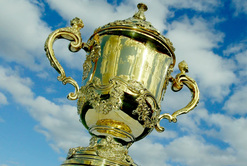
The benefits for a successful bid have been publicised however. It has been reported that Rugby World Cup 2023 would be worth €800m to the Irish economy. It's not known if that is a gross or net figure. Also, the basis on which this figure has been estimated has not been published. A key part of the supposed benefits will be an increase in tourism during the tournament and from the added exposure Ireland will get from the tournament being beamed into homes across the world. There cannot be a bid for any major sporting event that does not claim this. And yet the evidence for such a tourist boon remains elusive.
There were some salutary lessons for Ireland's bid in an article in Regions - the newsletter of the Regional Studies Association this month (the newsletter is available here but the latest issue has not yet been posted online). Based on a recent book chapter, Prof Marek Kozak of the University of Warsaw, examines the experience of Poland's co-hosting of Euro 2012 - the football European Championships finals. The paper considers the effect on tourism in the host cities and in non-host cities, Krakow and Lodz. Poland is a much larger country than Ireland (population approximately 38.5 million compared to 6.4 million on the island of Ireland), and the capital city is larger than Dublin and each of the other three host cities are larger than other Irish cities.
Prof Kozak finds that non-host cities experienced greater increases in Polish and foreign tourists numbers in 2012 and 2013 than host cities. He notes that for 2012 the largest numbers of tourists in staying in hotels was in August, after the tournament ended and that during the event, June 2012, an increase in the number of tourists was exclusively in non-hotel establishments. He says there was "no evidence of the impact of Euro 2012 on the number of tourists". In the absence of income data, Prof Kozak considers the effect on wages in Polish cities in 2012. He finds evidence that wages declined in host cities in 2012 - with no such decline in non-host cities (Lodz was unchanged and Krakow showed a slight increase). He concludes by saying that there is "no credible proof that Euro 2012 had a positive impact" on tourism and/or wages and incomes. While UEFA and its local partners obviously benefited (UEFA reported revenues of €1.4bn from Euro 2010) the costs of infrastructure, including maintenance fell on the Polish taxpayer and citizens.
There are important lessons here for the Irish government's support for the rugby world cup bid. Of course, the current government has no reason not to support a bid whose costs will fall on future governments and tax revenues. It is important to consider though the impact of displacement of tourism, where potential tourists that would have visited Ireland in Autumn 2023 will be put off by the tournament (and associated higher costs in hotels etc). The important thing to identify for such a bid is not tourist numbers but additional or net tourist numbers.
Perhaps the Irish will crack the code and generate the hoped-for benefits from the world cup. They would likely be the first to do so. To do so will require difficult questions to be asked. The lack of such challenges by media and opposition politicians does not bode well.
 RSS Feed
RSS Feed